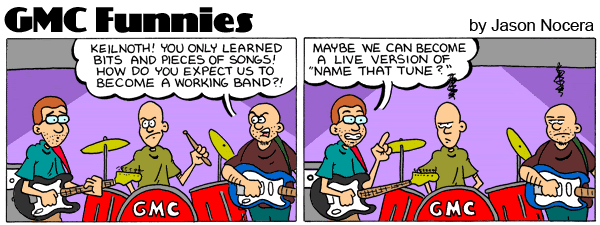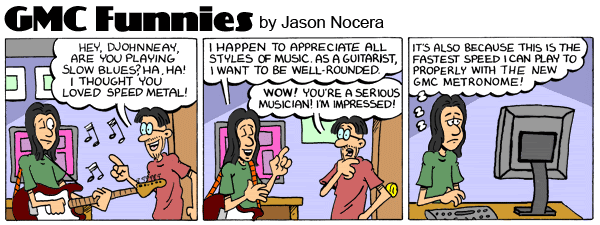Writing Your Own Music, Help |
|
|
|
|
|
| Sep 2 2009, 06:13 AM |
|
Well of the two questions, the second one has the shorter answer: Yes. You can choose to stay within one key for an entire song, or you can modulate or pivot the song's tonal center.
For beginners (like you and I), it will be much MUCH easier for you to improvise / compose a lead over a chord progression that is within one key. The downside is that if you are not comfortable with the chord harmonization available within a key, you may struggle at first to stay within a key if you're just playing chords you like. As an example, the rhythm guitarist / songwriter in my garage-rock highschool band just assumed that the key of C contained major chords built from all the notes that were neither sharp nor flat. At the time, I didn't know any better either, so we were a little puzzled. As you may have guessed, that's not the case The good news is that the easiest chords to play are ALSO the most flexible: power chords. They're a great place to start and they are not nearly as restrictive of key. Andrew's Theory Board here in the forums has an excellent description of chord harmonization within a scale. The chapter is easy to miss (I speak from experience) but it's called "Chords for Scales" and I will dig up a link. That chapter is here. The full table of contents is here. -------------------- ::jafomatic
http://jafomatic.net/tunes/ <-- Here lies the master collection of my collaboration and other improvisation recordings. |
|
|
||
|
|
|
|
| Sep 2 2009, 08:09 AM |
|
You can check this lesson as well. It really helps when you start composing.
|
|
|
||
|
|
|
|
| Sep 2 2009, 08:59 AM |
|
Hey everyone. Okay, I understand some theory and I learn it rather quick, but I just dont know how people put it all together and make a song. Could someone explain this to me? Also, lets say you write a song in the key of Em, do you stay in that key the whole song or can you change? Explain please. Thanks for the replies. When composing songs it is always good to learn the theory well since it will become a powerful tool to speed up the songwriting process. If you don't know theory well, all you can do is "poke in the dark", hoping that you will find something that sounds good. I suggest learning about keys, modes and chords everything you can. There are 7 scales that build 7 chords within every key, and you just have to know the chords very good. If you compose a song, you have to be aware of all the 7 chords within the key you are composing ALL the time. What this means is that you actually have to be able to learn the voicing changes so well that you can anticipate their movements in the progression. If you want to modulate keys, there are some usual modulations that were used in jazz, blues and other forms of music and other music styles accepted them and (sometimes) developed them further. You don't have to remember all these modulations, but it may be wise to go through many of them as possible just to get familiar with them. However, I strongly suggest that you do not start to learn about modulations unless you are very familiar with all the keys and all the chords within them. This post has been edited by Ivan Milenkovic: Sep 2 2009, 09:00 AM -------------------- - Ivan's Video Chat Lesson Notes HERE
- Check out my GMC Profile and Lessons - (Please subscribe to my) YouTube Official Channel - Let's be connected through ! Facebook! :) |
|
|
||
|
|
|
|
| Sep 2 2009, 02:01 PM |
|
Imo you should try to learn as many songs as possible,
it's endless process tho cause there are countless songs out there. But while learning them you'll realize how some things work, how chords are related within progression, what grooves you can use (drum and bass patterns) etc. Along with learning songs you'll naturally learn theory as well IF you analyze songs correctly which means that you always need to do some theory reading along the way. About Ivan's "poke in the dark", this method can work sometimes indeed but it would be wrong to leave it just like that, if you find something that sounds good using "poking" then you should also try to explain it to yourself using theory of course, then you'll learn how that thing happened and you'll be able to use similar thing again and again. Many composers actually have that "trademark", some motive that is repeating in many compositions, nothing wrong with that tho. Composing is tricky indeed, can't be explained or learned, it's never ending process and you should give it some time, work hard and learn things. -------------------- Youtube
MySpace Website Album "Let It Out" on iTunes and CD Baby Check out my video lessons and instructor board! The Pianist tune is progress,check it out! "ok.. it is great.. :P have you myspace? Can i to personalize this for you guy?" |
|
|
||
|
|
|
|
| Sep 2 2009, 08:19 PM |
|
I think that a lot about composing comes with experience. For instance, I am quite experienced in playing acoustic guitar and almost every time I get my acoustic I come up with something "new"
So what about theory??? That's exactly where you build upon the experience of other people, instead of your own!!!! Therefore, music theory is the best shortcut to start composing. So, in short learn the most you can about theory and then spend time learning songs and everything will come in time. -------------------- my "Thank you GMC!" video
If you like it please vote in the competition ;-) Gus Stairway to Guitar Heaven - my practice agenda Check out my lesson here Phrygian Dominant Solo lesson Gear : Ibanez RGT320q (I just love the neck-thru sustain), Washburn EA-20SDL (acoustic 6 string), Standard strat (Mexico), POD X3 Live Some of my Guitar heroes: Jimmy Page, Slash, Kirk Hammett, Augusto Licks, Joe Satriani, Gus G, David Gilmour, Mark Knopfler... |
|
|
||
1 User(s) are reading this topic (1 Guests and 0 Anonymous Users)
0 Members:
































